A walk from the serenity of rustic life to the streets of the City of London. Reflections.
07 Jan 2019
Life can be a real challenge, and we can be often too preoccupied to stop to realise that. Other times we don’t give ourselves enough credit when we face the difficulties on the way. What makes this challenge even more difficult is our ever-changing perception that is always distorted by the flurry of various emotional events that we embrace during our livelihoods. Lastly, from time to time, our forgetfulness can make us walk in circles.
We all encounter personal struggles in various quantities, sizes and strengths. Each impact can leave an emotional crater that over time can resemble the face of the moon.
In this post, I wanted to share with you some parts of my personal history that involved combating my anxieties and periods of stress. These experiences, nonetheless, lead me to have a life of constant discovery, learning and effort. Still, at the same, my internal reactions created a dark passenger of anxiety that sometimes learned to interrupt my daily flow.
In the conclusions section, I wanted to share some of the insights and lessons from these life’s twists and turns, and how they lead me to this point in time. If you are not interested in my story, which is fine because I respect your precious time, just jump straight to the conclusions section.
Stress often knocked on my mind’s door. Eventually, I opened the door a bit more, and it barged in. Sometimes fear helped me build a more resilient personality; other times, it made me feel vulnerable and useless.
I can sometimes be a slow learner. But I finally realised that if we keep ourselves exposed to our anxieties for too long, we make ourselves needlessly self-defeating and unhealthy.
For too long, I did not respect myself as a person and kept putting myself down in the process. I have enough of that, and I would want to warn you about the consequences of doing so in the long term. It is a sticky and tarry road to walk, and it often leads to a long and soul-destroying route. We need to remind ourselves that there are alternative paths to the one that is driving ourselves mad with fear, sadness or anger.
I don’t thoroughly enjoy talking about myself, mainly when I write to talk about my private life. I feel vulnerable and exposed for doing so. But on the other hand, the process makes me think clearer as I exorcise my demons. Instead of feeling grief due to loss of time, I begin to smile at my misguided past as a period of emotional incompleteness for which I shouldn’t blame myself.
Incompleteness, in my mind, can be more beautiful than perfection. It is like a short story that we are left to fill with our imaginary ending.
We can be smart and sensitive individuals at the core, but we often succumb to doubt. Doubt is good. Doubt stops us from the jump of the cliff before we realise we can’t fly. But when we question our ability to improve our lifestyle too often, that usually works against us.
I would like to send you words of encouragement that with enough effort, hope, time, external help and some self-analysis you can achieve a lot more than you realise. You are not alone in the journey, and I am going to share with you some of the challenges and struggles that I encountered and how I reasoned to deal with them.
Finding the way or the right path is not easy, and when we do find one, it does not mean that we will end up in an ultimate state of hedonism. Also, there is no nirvana at the end, and why would you want that anyway?
A new path does not feel more secure; our lives are not static, and bad things keep happening to us. But once we manage to peek into our mindsets, we realise that the only thing we can do is to influence our perception, and then we can alter the course of our emotional spate that follows.
It initially feels like an impossible task to start and set ourselves to achieve any goal, especially when it requires restructuring all the hidden layers of neuronal wirings that have entangled over time. Outside sources might also hinder our every effort or hope.
Yet, we need to endure some substantial defeats as we slowly gain momentum and I can assure you, in the end, all the little efforts will eventually accumulate to a more significant shift of change. However, there is no guarantee and certainty of time, and only by taking action, we can increase our chances of success. As we develop and learn, we can see the fruit of effort.
We don’t need to feel guilty to stop from time to time to reflect. If that is something that we need to do, then we need to find an appropriate environment to do so. And if rent does not let us make this decision, we need to pack our things and go somewhere else where we can afford it.
Occasionally, we might miss our main goals by an inch, and we might even end up on a different road, but that does not mean we might not like the views. If we get surprised, that is good because we have learned something new.
Let us remember, life is like a train and it can take us on, but it is us who make a choice where the ticket takes us.
About myself
The universal dice have rolled, and there I was born. I grew up on in the Polish countryside. My grandparents worked tirelessly, running our tiny farm. My grandfather and my father worked in a local factory that manufactured metal ball bearings. I usually have a good memory, but some past details got fairly hazy over the years. Fortunately, I found an old picture from the time I was about three as a reminder:
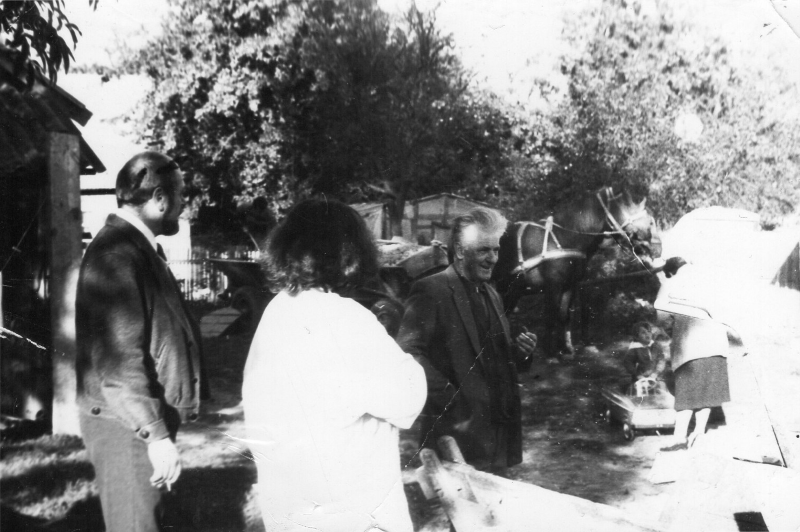 My uncles, aunt, grandmother and a tiny version of me
My uncles, aunt, grandmother and a tiny version of me
From an early age, I worked on various agricultural tasks. I took care of my siblings while parents and grandparents were busy at work. It was not unusual at my time for older kids to care for younger kids. I became very patient by caring for others and tending other living beings on the farm. It was not my thing. It was a duty.
My family are a bunch of wacky, tenacious and hard-working people; I didn’t have it hard, and it was a bit of a crazy-house when we worked together. Besides, I loved the feeling of growing and harvesting the food; there was something natural to put the fruit of our work at the table at the end of the day’s labour.
I often got annoyed that rural people usually didn’t get respect for their labour. Perhaps this is just one of the social animal quirks when it comes to showing off our hierarchical status.
Anyway, I loved the expanse, the freedom and the beauty of the surroundings that nature provided us.
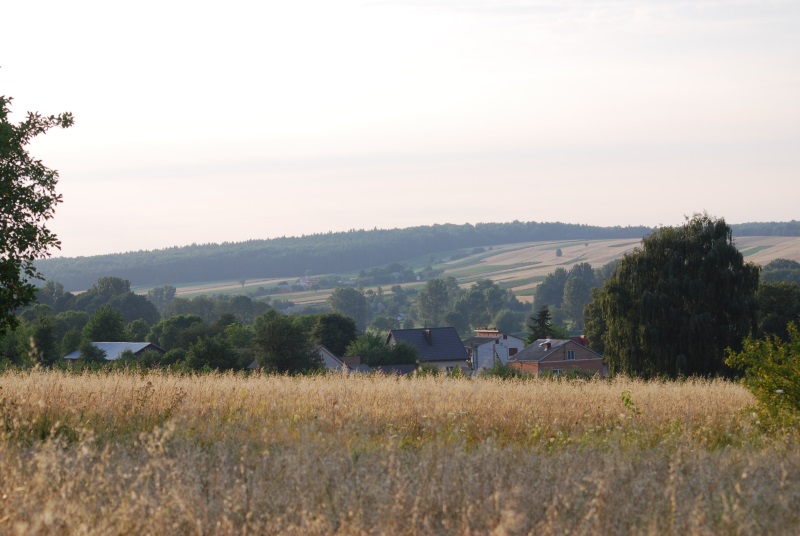 Popkowice. My birthplace in Poland
Popkowice. My birthplace in Poland
I had some upsetting moments in my childhood, however, which I can attribute to my biological father. Without dwelling on the details, he made our lives quite unpleasant. I don’t have many good memories of him. I often found him quite displeasing and impulsive, but I still cling to a few snippets of positive occurrences that I can remember:
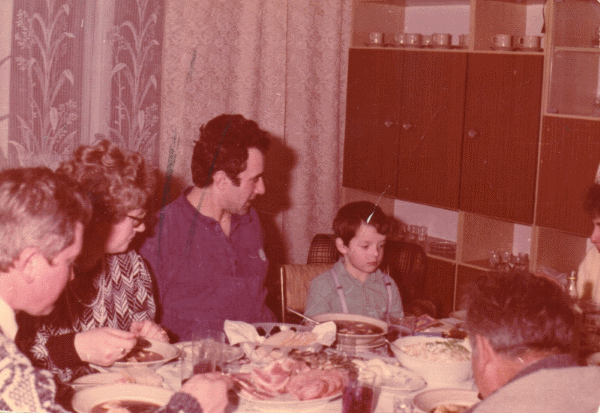
My mother had to soak the emotional and physical shocks when his mood oscillated and turned him either into a Jekyll or Hyde; I always wondered what the inspiration behind Robert Louis Stevenson stories was.
Eventually, she found enough courage to dissolve that unfortunate relationship. It was not emotionally comfortable in a small Catholic community like ours - such an act labelled us with a social stigma. I vaguely remember, but I think we encountered hostility from a few family members; luckily without severe consequences. As a kid, I was confused, but today I understand that this is quite a normal social behaviour where reputation serves as currency. Any threat to the loss of its value usually meets with hostility.
Sadly during that episode divorces were not recognised by the Catholic Church, even if there was substantial evidence of abuse done by the husband. It was probably one of the seeds that grew up to make me dislike the organisation.
Eventually, my mother remarried to a decent and dedicated man who helped us build a new and better life.
For years I felt very resentful towards my biological father. Still, a couple of years ago, I managed to accept the past, soothe my inner anger, find some remorse and perspective. A resonating Catholic mantra: “Honour thy father and thy mother,” made my perceptual battle between anger and guilt even more severe. Unfortunately, I will never be able to talk to him about the past or how it affected me because he has passed away. The only way I can deal with that now is to say to myself “dad, you were a real arsehole.”
I had to dismiss my religious teaching to ease the pain of my mental fracture. Now I believe it is okay to get annoyed with our parents, and I think some don’t deserve our full respect. Yes, they gave us life, but some rob us of its pleasures. And if they had a similar experience growing up that doesn’t count as an excuse - they made an excuse to stop themselves doing it to their kids.
No one deserves living in needless misery. If our parents give us a hard time for no reason, we have the right to be angry. They had the responsibility to embark the challenges of childbearing, which is tough, but if they did make a mistake on that, they have to deal with it, it is not our fault.
Okay enough about parents, now let me say few things about school.
In school, I considered myself to be just an average and relatively quiet kid. Still, girls liked me as I made them laugh, and I enjoyed their presence.
I regret some things I had done in moments of juvenile ‘ignorance’; as immature apes, we spend a significant amount of time trying to impress others.
I always enjoyed studying, dreamed of building discovering or coming up with ideas that I would do great things as many kids would usually do and I hoped for a future either in technology, science or art. However, I regularly rebelled internally against my dry curriculum and schooling methods that mostly focused on remembering things, so I lost focus quickly.
Some of our educators were extremely unpleasant, and a few were even physically abusive. Few found enormous pleasure to pick on me maybe because I was amicable and didn’t stand up for myself that much. When I did, I got slapped. Sometimes I grew pessimistic and stopped putting that much effort, and some of the time, I just learned to switch to an autopilot mode.
I reasoned that these people endured a similar educational developed during Soviet times that broke people psychologically to produce obedient automata.
Some teachers grew bitter as a result of this process by facing overcrowded classes of 40 or more kids per class times 6-8 hours a day for countless years for a measly wage. Some in this way got humanity sucked out of them. Perhaps. Or maybe this is how we, social primates, work by always making some people miserable to make ourselves more superior?
Whatever the reason, I feel a sincere regret that some stuck in a limbo and didn’t work out a better pedagogical approach. Few of my peers, regardless, did very well so I can’t generalise, perhaps this was not something that fit me.
In the end, I decided to quit high school and emigrate to the UK to join my working parents with a hope of finding more luck abroad.
Settling in the UK had its challenges and opportunities. I had no chance of going back to school, where I left off because I didn’t speak English. My academic achievements were awful - back in Poland, and I was borderline at failing sciences. As a result, I worked as a kitchen porter for the first couple of years in a small catering company. At the same time, I was attending English classes for Speakers of Other Languages (ESOL). The job itself was menial but was still better than some other low skilled jobs I did attempt.
The beginnings are always hard, but once we pick ourselves from the bottom, it can get only get better.
My mind was numb, and often I failed to cope internally. I tried not to complain, but I suffered from extremely low self-esteem, and I thought I would be stuck scrubbing the dishes forever. I was forlorn, but I tried to make my work more efficient to tackle cooking duties which were creative and rewarding. I was also happy that I was able to slip away in the realm of ESOL classes for a couple of hours a day… Some folks gave me a surprisingly hard time, and I occasionally I hated the environment. I had to come up with some sort of solution to my situation or change my mindset.
Eventually, I moved up the ranks to work as a chef. I liked that job more since it gave me the skill to create things out of raw ingredients which combined a bit of art and science.
I have a natural sense of smell, and I love eating. So the transition was natural. The hard thing was to learn the end to end process of food preparation and delivery. We worked on various venues across the UK and France. On several occasions, I joined my step-father to do shopping in the New Covent Garden Market in Vauxhall that was bustling with life at 5 a.m.
Ultimately, I began working on various so-called high profile events. The experience was quite rewarding, and I travelled a lot. I think the following picture probably shows off one of my proudest moments where we were gracefully finishing off before it was sent off (I regret not having more photos from that episode):
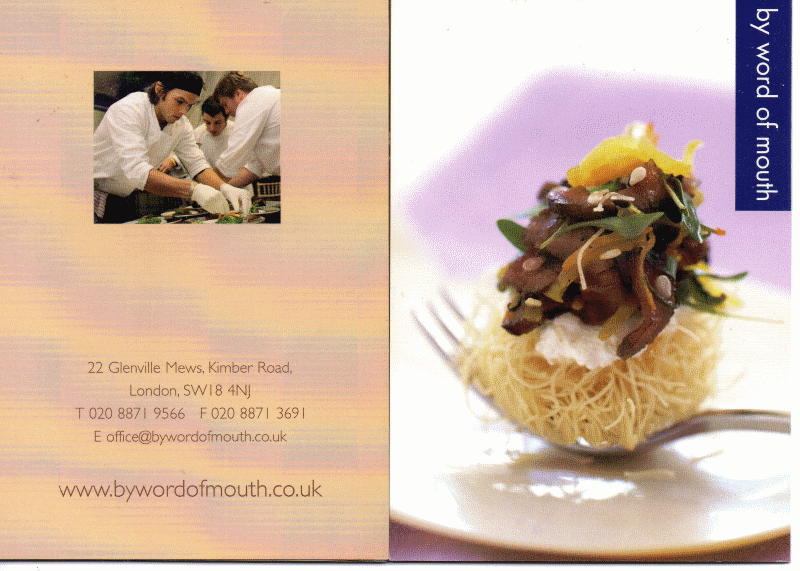
My step-father worked monstrously unsociable hours as a chef, sometimes 80 to 100 hours a week. I never understood where he gained his strength or motivation from, but I was neither that passionate nor had such a large supply of stamina to follow his steps, but I still tried to keep up. Besides, I always ate more than a healthy amount, and I was afraid that one day I would explode like Mr Creosote in Monthy Python:
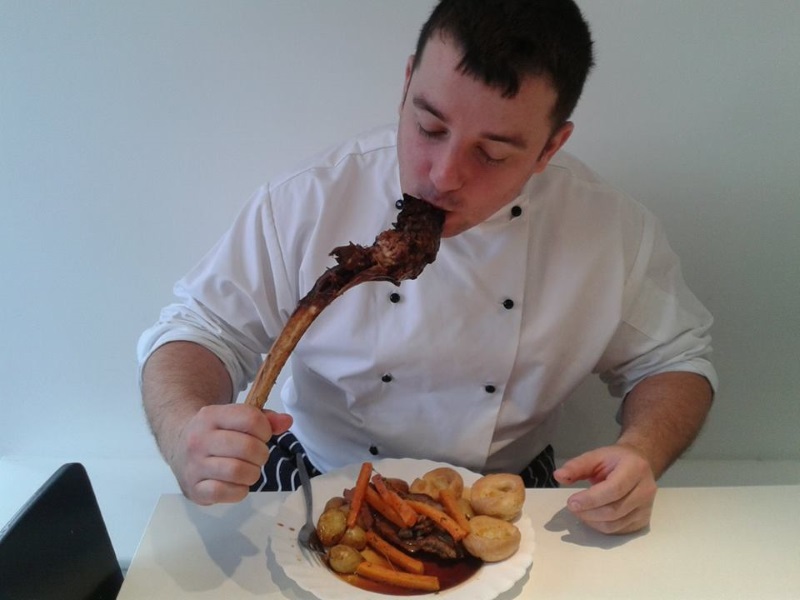 Food is my soft spot
Food is my soft spot
Regardless of some physically and mentally painful periods at work, I met a bunch of fantastic, honest, insane and hard-working individuals from around the world that took great pride in creating art to be served as food. Some people were to me as a foster family, and some cheered me through my journey.
These were my teenage years, intertwined with happy and less pleasant memories. Eventually, I raised the courage to snap out of it because this was not something I wanted to do in the long term. I thought:
'If I don't want to do this for the rest of my life I need to act now.'
The emotional kick launched me back to education, where I regained my inner passion for natural sciences. I helped it by reading various books on biology in my local library. I also began paying more attention to the English language.
I often used to fear and anger to help me achieve my focus and as a whip for motivation. I began absorbing information through my skin.
Simultaneously, I was becoming more anxious, and my mood deteriorated. I focused on studies and dismissed my mental hygiene; how I wish now I could go back in time and tell myself to stop torturing myself.
In my young and foolish head, I started developing a mental schema where I had to break my mind to make things happen - I adopted post-soviet education strategies from my past and deployed them on myself. I launched myself into a learning orbit and almost ended up sharing the same fate as Laika.
It was again a distressful episode, but luckily I became stoical and focused on my goal of going back to full-time education while burning emotional fuel.
Eventually, I reached a point I was confident enough with my English. That prompted me to apply to a British college that would either provide me with a chance to study science or art subjects; I am creative, and I enjoy drawing so the latter was my backup option.
Initially, I called around a few places, but I got nowhere. Whoever I called replied: “Sorry, I am afraid we don’t have anything that would fit your profile.”
I was getting desperate. At some point, I decided I got so anxious that I went in person to one of my colleges of choice to ask for direct help from people involved in student enrollment. The lady I spoke to had noticed that I was keen and sincere. So that helping hand took me onboard to West Thames College in London.
They initially placed me in a cohort of science retakers - this was a bit of a workaround to fit my case, but it worked. I was so delighted with the outcome, and I immersed myself in studies hoping they could eventually bring me closer to less physically strenuous opportunities than the work in the kitchen.
I wanted to expand my imagination and fill it with information on how stuff works in our quirky universe.
Each day became a contest and hope of a more intellectually satisfying life and some evidence that I can do it. My educators were extremely encouraging, kind and supportive. Their feedback indicated that I was doing particularly well. I grew more confident and kept making progress - positive emotions pushed me forward.
I didn’t understand half of the vocabulary in the books I was reading. I re-read them until they made some kind of sense.
Within a year, I made exceptional progress from being a bag full of doubt to acing the exams. As a result of this effort and support, I got an offer from Richmond Upon Thames college to continue my next rendezvous with sciences.
A year fast forward.
I realised that I had enough momentum. I began to the gate of further education on the horizon, but I still walked through a thick fog of self-doubt. Everything was always moving quite quickly for me; therefore, I was unsure if it all will end up in a crash or a success.
I felt embarrassed that I would be entering further education as a mature student. Still, in my blended thoughts, I recalled an extraordinary and inspiring story that I read somewhere about George Green. He was a gifted mathematician who entered his degree at an unusual stage of his life - I urge you to read his story.
Although I never considered myself to be exceptional at that level, I pushed myself to the limits of human sanity to have a stab at having a University education.
I felt as if my body was going through a meat-grinder and often felt sick with stress that I could quickly feel in my marrow. Eventually, I asked for extra support in my college, which was a way more productive and effective approach than trying to do it all myself. When we are shy, we make an unfortunate mistake of stopping ourselves from reaching out.
A week before Christmas of 2001, I received an offer to read Natural Sciences at King’s College, Cambridge. It was way more than I ever expected. A mistake, an overshot in my ambitions? These were my initial thoughts. No, it was no mistake. I took the offer with overjoy, but the whole new thing terrified me. It was a chance I worked remarkably hard to escape my working-class reality.
 One of these beautiful days in King’s College, Cambridge
One of these beautiful days in King’s College, Cambridge
University life changed my life for better and worse. The significant parts of it were that it offered us were libraries piled with wisdom from various high-achievers, culture and sometimes quirky people. It was a ticket to excellent support and life shielded from the outer world by an invisible and pampering barrier for some time.
The part I struggled the most was the sheer volume of information we had to sift through. Often I thought it was impossible; some people whizzed past effortlessly, and I fixated only on them and didn’t see left behind or running at the same speed.
I regressed from the good practice of asking more in-depth questions by fear of being judged by some of my peers. I often grew quiet, pessimistic and embarrassed. Sadly I gave in back to the inner insecurities that I thought I worked hard to eradicate.
After working more than half of my summers in catering, I devoted the rest of the time for extra studying so I could keep up. I always felt deflated.
During my academic years, I kept building up an unhealthy level of self-doubt as a result of comparing myself to the top students. In the end, I managed to correct my inner tensions and pull myself through. It was partially due to the fear of regressing to my former life. But, my most significant and positive contribution came from having great inspiring educators and fantastic friends about.
In the end, my undergraduate education was one of the best episodes of my life, and I might write more about Cambridge experience on a separate post in the future.
Life as an undergraduate came to an end. After the graduation ceremonies, like millions of people out there, I had no idea what to do next.
Few of my close peers appeared to secure jobs in the industry or public sector. I did try to get a role in the private sector, but after dozens of job interviews and rejections, I was back cooking food.
I was on a lost path. Again.
Should I continue shaping my career path as a scientist in the field of Physics and keep seeking comfort in learning and exploring the unanswered questions about our universe? I wondered. I was still profoundly interested in emergence phenomena, and I always hoped to study systems whose individual parts and their interactions give rise to new measurable properties that we could harness to our benefit.
I moved to do my PhD to Bath University, UK. During my physics doctorate, I discovered that scientific life is not what I had imagined. I shook by the reality that tried to wake me up.
I felt out of place, often extremely isolated and burdened with research that I could not find connection with my field. I questioned my passion for natural sciences, and I perpetually thought of quitting.
I discovered that relation with the supervisor could resemble a marriage. After trying every tool in my perception to I re-frame my view of the relationship, I wanted a divorce.
He initially criticised me for being a lousy scientist, but when I asked him how I could improve to become a better one, he didn’t give me an answer. He was a great scientist, but a lousy negotiator. I often felt we were like Richard Pryor and Gene Wilder in the movie “See No Evil, Hear No Evil” struggling to solve scientific problems.
Nonetheless, I learned to find consensus by focusing on science rather than personal differences. Additionally, I determined that only one person should be angry at a time in a group.
I often kept employing a carrot and stick strategy on myself just to save my face and felt like a donkey holding a stick with a carrot occasionally hitting itself in the head with it.
Writing and publishing mechanism required intense dedication, so I kept encouraging myself with thoughts that all this unease and intellectual effort would further shape my character - that strategy also helped me cope. In this way, I learned that a PhD requires ironclad resilience once one stops enjoying it.
We all shift in our preferences in life, but unfortunately, we forget to realise that we need to pay the penalty for these changes. These punishments are often stressful, but at the same time, they can pave the way to new opportunities.
As time passed by, I slowly drained my scientific thoughts together onto paper and pipelined data into various spreadsheets and scripts. My supervisor applied his magical talents of experience to deliver scientific publications in a state fit to be submitted to top physical journals. I am grateful that I had his guidance, but I wish it were less emotional. I presume that our emotions are too difficult to control, especially when we have more scientific minds.
I kept running a narrative in my head to keep me motivated: I can work near a nuclear reactor and study exotic samples at 4 a.m. in Grenoble, France, or a proton accelerator at Oxfordshire labs. Sometimes I was madly excited and even wondered if madness is a prerequisite to doing this kind of stuff. I also met a popular YouTuber Phil Mason (or Thunderf00t) during one of my experiments.
The thrill of figuring things out and discovering something new kept my inner spark lit.
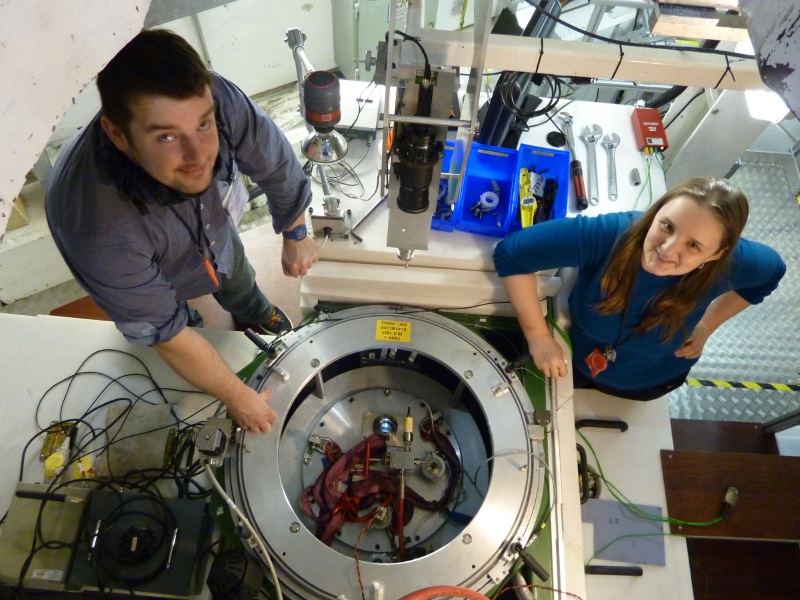 My colleague Ruth and myself during PEARL diffractometer experiment at ISIS Neutron and Muon Source at the STFC Rutherford Appleton Laboratory near Oxford in the United Kingdom
My colleague Ruth and myself during PEARL diffractometer experiment at ISIS Neutron and Muon Source at the STFC Rutherford Appleton Laboratory near Oxford in the United Kingdom
When I look back at the whole postgraduate experience, I appreciate the challenge, and I am glad about 30 to 40 % of the time that I persisted. The rest of the time, I wish I had the guts to crash out earlier and start building wealth. Nonetheless, I managed to take a peek into real scientific research, people in it, I had a chance to contribute to the field and even write about it.
I felt bitter that it took me all these years to unveil. I didn’t see myself fit to do physics.
As always, I shrugged my shoulders and said to myself, the world does not end.
I identified a growing interest in technology, analysis and design, and so I thought that would be something closest after Physics. But perhaps the biggest motivator was to have better means to pay the rent.
I turned onto a quest to devote any time I could spare to learn programming basics. Then I found a technology role and left scientific life behind. After a few hiccups and using my cooking skills to survive, I joined a small startup in the City of London.
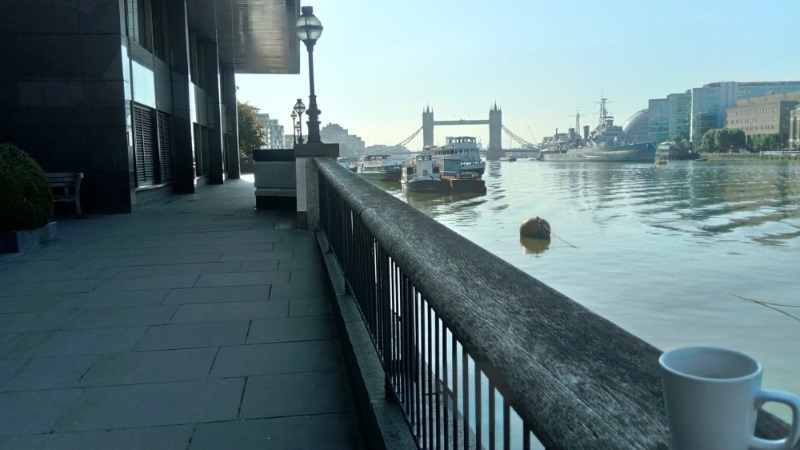 London Bridge
London Bridge
The transition to the technology domain was still tough because the work in technology still requires domain knowledge and experience.
Some of us in the physics community can often become naive because for a prolonged time we are taught to apply models to idealised systems, and in the process, we learn to smooth out the quirks of everyday life. So sometimes the abstractions you make in physics are useless in the real world and when you realise that you are standing there with a blush on your cheeks.
Once I began to settle, the satisfaction of building technical solutions, attending client meetings, and hands-on problem solving that gave quicker results than those in the research lab felt great.
Tightly packed in my office coop, consumed with work, and I fought tirelessly. I worked on various projects to get a sense where I could fit. I rotated a lot between front-end development, back-end development, administration and client interaction. Given we were a startup of only eight people, I juggled a lot of tasks. The experience also allowed me to work with a range of different characters and learn about business and people.
I was not happy with my work, but it paid the bills, and it allowed me to build up experience. In my last year, I embarked a more significant share of administrative responsibility because a couple of people left. Then I learned a great lesson that when you try too hard, you get served more accountability.
I began experiencing a loss of joy due to the lack of creative work which I found during development tasks. When I noticed that my work transitioned into full-time administration role and my initial pursuit of software development was vanishing from my horizon, I felt emotionally entangled.
I did my best to do my tasks and communicate that with my co-workers that I don’t want this role. Working in technology means that such issues are more challenging to solve rather than “switching it off and on again.”
Eventually, I worked out with my ex-employer an exit strategy and our ways parted.
I did some soul-searching, spent time with my family and tasked myself to find a new startup opportunity that would let me practice and apply my skills in a new direction. I will write about this on a separate post.
The whole experience also made me realise that for a long time, I have been needlessly hostile towards myself and forgot to appreciate my friendships and relationships in my life.
Life is too short to be so hard on oneself.
I began refactoring my mind ever since, and I would like to share my experiences and ideas with you as I on my journey.
Conclusions I gathered from my journey so far that we should keep reminding ourselves
When I reflect on my past, I consider myself to be extremely lucky. I am not a rockstar, and I have not seen it all, but the experience that I got so far is enough to keep opening my sails for some more exploration.
I always appreciate the people who helped me in the process when I sought help, but I take note that the unpleasant encounters were of equal importance. Both sides of experience allow us to build a more holistic picture of the world that surrounds us.
I was often too pessimistic and unhappy. Whether wittingly and unwittingly, I let my emotions to sail into that direction. What I would like to ask you a favour: do not do that to yourself. Don’t let ambitions ruin your enjoyment of life; I can tell you it is not worth it and will leave you with anxiety and even depression.
I often felt guilty of wasting so much time overthinking and dwelling over my frustrations and not moving forward but spend hours in a cocoon of anxiety and over-analysis. For example, it took me a significant amount of time to emotionally recover after quitting school or when I kept failing to get a more comfortable and hoping to secure a profession with more stability.
More importantly, I did not fully appreciate what great opportunities I had in my life, but the leaps I made were challenging. Sometimes it was my naive arrogance, ignorance and self-absorption. It might be common for us to be too hard on ourselves; we speak of it too little.
When I lose my track, I keep reminding myself a story of Paul Alexander. He embarked his life with full-body paralysis and made me incredibly humble.
It is intriguing to see when people work around their limitations, manage to put them aside and focus on what is crucial for them and work tirelessly to mould their future of a shape they want. But I do not wish to get sucked into a world of constant comparison.
Regardless, I noticed that Paul had a very encouraging mother who believed in him. So what I realised that when we don’t have such support, we should not rob ourselves of hope.
After deep contemplations during my breaks, self-reflection, talking to my partner and begun reading developmental Psychology books, I have started to change my perspective.
I had proceeded to repaint the picture that my mind sees and add more colours to my worldview. I realised that each transition and struggle presented me with a different angle I see life, other people and myself in it for which I should be more grateful rather than resentful.
It just took me a long time for all of it to crystallise and free myself from the self-engineered prison of pessimism. I won’t lie that I entirely became anxiety-free, but I have a deep conviction that real learning has just begun, and I am willing to embark difficulties now with a different mindset.
The whole writing exercise also provided me with a good quality canvas to paint a big picture of my character, which then I viewed from a third-person perspective and spotted visible distortions in my observations. I highly recommend this exercise to anyone. This exercise can significantly help to retrace our steps and fix the loose wiring.
If you made this far and you think that you are in a rut then I urge you to start poking new possibilities at whatever stage of life you are on or whatever you do.
Start probing new subjects gradually. Give yourself twenty to thirty days to experiment with something new, even if you don’t like it. Each encounter of discomfort and failure will pave new pathways in our minds. Gradually we begin to observe overlaps in our collection of concepts, and sometimes that makes it easier for us to navigate the world.
I never considered myself to be unique, intelligent or fit to the things I am doing now, but the only approach I can take is to chisel the wall of resistance of my mind until it is gone. When it grows back again, I have to be ready to keep my chisel close.
Also, I would recommend you to start working early on noticing yourself and begin doing what you want no matter what others say or whatever inner voice of self-doubt tells you. It is better to fail at your endeavour than never attempting it.
Lastly, It is never too late I promise, just remember to have hope, ask for help, allow for some pain and give yourself time. Be patient. Then share your own story or keep it for yourself. But the most important thing is to learn to have fun while learning.